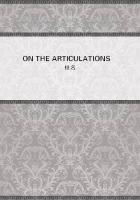The Rev. Dr. Middleton, Clara, and Sir Willoughby When Master Crossjay tumbled down the stairs, Laetitia was in Clara's room, speculating on the various mishaps which might have befallen that battered youngster; and Clara listened anxiously after Laetitia had run out, until she heard Sir Willoughby's voice; which in some way satisfied her that the boy was not in the house.
She waited, expecting Miss Dale to return; then undressed, went to bed, tried to sleep. She was tired of strife. Strange thoughts for a young head shot through her: as, that it is possible for the sense of duty to counteract distaste; and that one may live a life apart from one's admirations and dislikes: she owned the singular strength of Sir Willoughby in outwearying: she asked herself how much she had gained by struggling:--every effort seemed to expend her spirit's force, and rendered her less able to get the clear vision of her prospects, as though it had sunk her deeper: the contrary of her intention to make each further step confirm her liberty. Looking back, she marvelled at the things she had done. Looking round, how ineffectual they appeared! She had still the great scene of positive rebellion to go through with her father.
The anticipation of that was the cause of her extreme discouragement. He had not spoken to her since he became aware of her attempted flight: but the scene was coming; and besides the wish not to inflict it on him, as well as to escape it herself, the girl's peculiar unhappiness lay in her knowledge that they were alienated and stood opposed, owing to one among the more perplexing masculine weaknesses, which she could not hint at, dared barely think of, and would not name in her meditations.
Diverting to other subjects, she allowed herself to exclaim, "Wine, wine!" in renewed wonder of what there could be in wine to entrap venerable men and obscure their judgements. She was too young to consider that her being very much in the wrong gave all the importance to the cordial glass in a venerable gentleman's appreciation of his dues. Why should he fly from a priceless wine to gratify the caprices of a fantastical child guilty of seeking to commit a breach of faith? He harped on those words. Her fault was grave. No doubt the wine coloured it to him, as a drop or two will do in any cup: still her fault was grave.
She was too young for such considerations. She was ready to expatiate on the gravity of her fault, so long as the humiliation assisted to her disentanglement: her snared nature in the toils would not permit her to reflect on it further. She had never accurately perceived it: for the reason perhaps that Willoughby had not been moving in his appeals: but, admitting the charge of waywardness, she had come to terms with conscience, upon the understanding that she was to perceive it and regret it and do penance for it by-and-by:--by renouncing marriage altogether? How light a penance!
In the morning, she went to Laetitia's room, knocked, and had no answer.
She was informed at the breakfast-table of Miss Dale's departure.
The ladies Eleanor and Isabel feared it to be a case of urgency at the cottage. No one had seen Vernon, and Clara requested Colonel De Craye to walk over to the cottage for news of Crossjay. He accepted the commission, simply to obey and be in her service: assuring her, however, that there was no need to be disturbed about the boy. He would have told her more. had not Dr. Middleton led her out.
Sir Willoughby marked a lapse of ten minutes by his watch. His excellent aunts had ventured a comment on his appearance that frightened him lest he himself should be the person to betray his astounding discomfiture. He regarded his conduct as an act of madness, and Laetitia's as no less that of a madwoman--happily mad! Very happily mad indeed! Her rejection of his ridiculously generous proposal seemed to show an intervening hand in his favour, that sent her distraught at the right moment. He entirely trusted her to be discreet; but she was a miserable creature, who had lost the one last chance offered her by Providence, and furnished him with a signal instance of the mediocrity of woman's love.
Time was flying. In a little while Mrs. Mountstuart would arrive.
He could not fence her without a design in his head; he was destitute of an armoury if he had no scheme: he racked the brain only to succeed in rousing phantasmal vapours. Her infernal "Twice!" would cease now to apply to Laetitia; it would be an echo of Lady Busshe. Nay, were all in the secret, Thrice jilted! might become the universal roar. And this, he reflected bitterly, of a man whom nothing but duty to his line had arrested from being the most mischievous of his class with women! Such is our reward for uprightness!
At the expiration of fifteen minutes by his watch, he struck a knuckle on the library door. Dr. Middleton held it open to him.
"You are disengaged, sir?"
"The sermon is upon the paragraph which is toned to awaken the clerk," replied the Rev. Doctor.
Clara was weeping.
Sir Willoughby drew near her solicitously.
Dr Middleton's mane of silvery hair was in a state bearing witness to the vehemence of the sermon, and Willoughby said: "I hope, sir, you have not made too much of a trifle."
"I believe, sir, that I have produced an effect, and that was the point in contemplation."
"Clara! my dear Clara!" Willoughby touched her.
"She sincerely repents her conduct, I may inform you," said Dr.
Middleton.
"My love!" Willoughby whispered. "We have had a misunderstanding.
I am at a loss to discover where I have been guilty, but I take the blame, all the blame. I implore you not to weep. Do me the favour to look at me. I would not have had you subjected to any interrogation whatever."
"You are not to blame," Clara said on a sob.
"Undoubtedly Willoughby is not to blame. It was not he who was bound on a runaway errand in flagrant breach of duty and decorum, nor he who inflicted a catarrh on a brother of my craft and cloth," said her father.
"The clerk, sir, has pronounced Amen," observed Willoughby.















